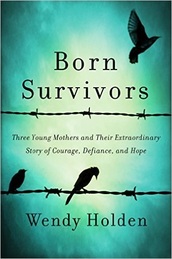
In her 2015 book Born Survivors: Three Young Mothers and Their Extraordinary Story of Courage, Defiance, and Hope author Wendy Holden tells the story of three young Jewish women in Nazi occupied Europe who were torn from their idyllic lifestyles and thrown into the horrors of the Holocaust. Holden follows each of these women through their separate yet parallel courses through various ghettos and camps, never losing sight of the unique characteristic of these three women’s experience.
Born Survivors is the story of three women each of whom, despite horrific conditions, managed to carry and give birth to a child in the midst of the malnutrition, disease, filth, and abuses imposed upon them by the Nazi regime during the Holocaust. Mothers Priska, Rachel, and Anka were in a group of over 1,000 prisoners who were first in the Frieberg labor camp before being packed into cattle cars and transported across Eastern Europe for sixteen days, ending their journey at Mauthausen just a few days before its liberation in 1945. Throughout their struggle the three women never came into contact with one another nor were they aware that they were not alone in their situation.
Despite the women’s lack of knowledge of one another, Wendy Holden has artfully woven together these three stories in a way that leaves the reader feeling personally invested in the fates of these expectant mothers facing the most dire of conditions. Not unusual to many Holocaust survival narratives, Holden’s book illustrates the extreme, inhumane conditions in which people fought to survive and in which many ultimately perished. However what makes this research on the Holocaust so unique is that it not only tells the stories of the three mothers and their harrowing experiences, but it also tells the story of their children who, against all odds, would live to become the youngest of today’s Holocaust survivors.
Earlier this year I had the pleasure of attending the North American book launch of Born Survivors in Skokie, Illinois and was delighted to hear not only from the author of the book, but from the born survivors themselves. Hana Berger Moran, Eva Clarke, and Mark Olsky, a doctor and long-time Wisconsin resident, reaffirmed Holden’s depiction of the three children who met for the first time at the 65th anniversary of the liberation of Mauthausen on May 8, 2010. “We have been brought together by chance but we now have a permanent bond and feel such a sense of togetherness. I am absolutely delighted to call them my sister and brother.” The connection between the three “siblings” is no doubt a reflection of their shared experience, but also a result of the bond they share in remembering the incredible courage of their mothers in ensuring that their children would not only be born, but that they would live to survive.
Born Survivors is the story of three women each of whom, despite horrific conditions, managed to carry and give birth to a child in the midst of the malnutrition, disease, filth, and abuses imposed upon them by the Nazi regime during the Holocaust. Mothers Priska, Rachel, and Anka were in a group of over 1,000 prisoners who were first in the Frieberg labor camp before being packed into cattle cars and transported across Eastern Europe for sixteen days, ending their journey at Mauthausen just a few days before its liberation in 1945. Throughout their struggle the three women never came into contact with one another nor were they aware that they were not alone in their situation.
Despite the women’s lack of knowledge of one another, Wendy Holden has artfully woven together these three stories in a way that leaves the reader feeling personally invested in the fates of these expectant mothers facing the most dire of conditions. Not unusual to many Holocaust survival narratives, Holden’s book illustrates the extreme, inhumane conditions in which people fought to survive and in which many ultimately perished. However what makes this research on the Holocaust so unique is that it not only tells the stories of the three mothers and their harrowing experiences, but it also tells the story of their children who, against all odds, would live to become the youngest of today’s Holocaust survivors.
Earlier this year I had the pleasure of attending the North American book launch of Born Survivors in Skokie, Illinois and was delighted to hear not only from the author of the book, but from the born survivors themselves. Hana Berger Moran, Eva Clarke, and Mark Olsky, a doctor and long-time Wisconsin resident, reaffirmed Holden’s depiction of the three children who met for the first time at the 65th anniversary of the liberation of Mauthausen on May 8, 2010. “We have been brought together by chance but we now have a permanent bond and feel such a sense of togetherness. I am absolutely delighted to call them my sister and brother.” The connection between the three “siblings” is no doubt a reflection of their shared experience, but also a result of the bond they share in remembering the incredible courage of their mothers in ensuring that their children would not only be born, but that they would live to survive.
